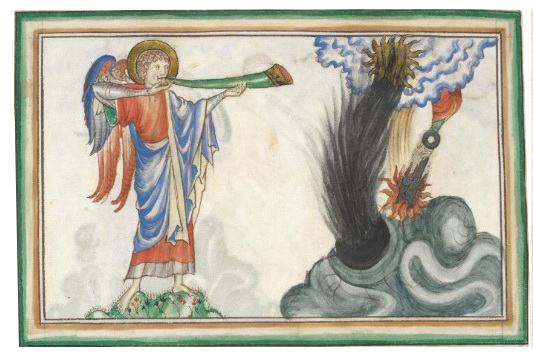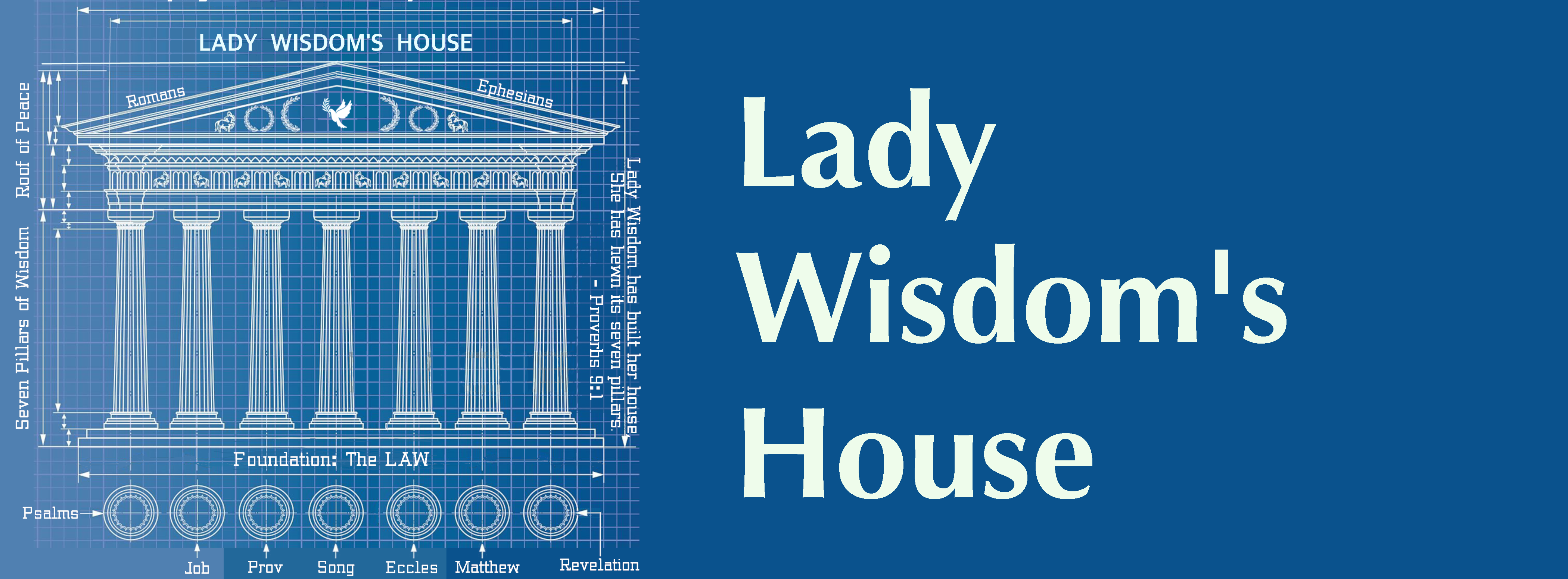153 and the Fifth Trumpet
1416 words long.
Published on 2024-03-30

The Fifth Trumpet of Revelation
It is time to move from Habakkuk to Revelation. Habakkuk described five empires that would oppress Israel. This part of Revelation describes the crisis that destroyed the fifth, the Ottoman Empire, last of the Islamic Empires.
And the fifth angel blew his trumpet, and I saw a star fallen from heaven to earth, and he was given the key to the shaft of the bottomless pit. He opened the shaft of the bottomless pit, and from the shaft rose smoke like the smoke of a great furnace, and the sun and the air were darkened with the smoke from the shaft. Then from the smoke came locusts on the earth, and they were given power like the power of scorpions of the earth. They were told not to harm the grass of the earth or any green plant or any tree, but only those people who do not have the seal of God on their foreheads. They were allowed to torment them for five months, but not to kill them, and their torment was like the torment of a scorpion when it stings someone. And in those days people will seek death and will not find it. They will long to die, but death will flee from them.
In appearance the locusts were like horses prepared for battle: on their heads were what looked like crowns of gold; their faces were like human faces, their hair like women's hair, and their teeth like lions' teeth; they had breastplates like breastplates of iron, and the noise of their wings was like the noise of many chariots with horses rushing into battle. They have tails and stings like scorpions, and their power to hurt people for five months is in their tails. They have as king over them the angel of the bottomless pit. His name in Hebrew is Abaddon, and in Greek he is called Apollyon.
The first woe has passed; behold, two woes are still to come. (Revelation 9:1-12)
In the fifth section of Habakkuk, in chapter 2, the five woes were delivered in reverse order. Thus the first woe in Habakkuk was for the fifth beast, Islamic Civilization. By chance or design, the first woe in Revelation also comes during the waning days of Islamic Civilization. In another suggestive correspondence, Revelation’s fifth trumpet matches Habakkuk’s fifth empire.
Peace dove into the timing of the opening of the seals and the trumpets which we shall not alter here. It placed the blowing of this fifth trumpet during the Industrial Revolution. The idea is simple. God raised up the European Colonial Empires to judge the peoples of the world but leave the church alone. The source of their power was new technology and a new economic system: capitalism. The textual marker for this is the phrase “smoke like the smoke of a great furnace, and the sun and the air were darkened with the smoke from the shaft”. Does that not describe the smoke from coal furnaces used to power factories?
It is fashionable for liberals to despise the evils of colonialism and conservatives to trumpet its benefits. The Bible’s judgment is clear. It came from the bottomless pit! Nevertheless, God directed the capitalist empires to serve His purposes. They did destroy many non-Christian cultures, called in the passage “those people who do not have the seal of God on their foreheads”. They also left the church to pursue its missionary enterprise mostly unimpeded. The church and Christians are referred to by the phrase “grass of the earth or any green plant or any tree”. God told the locusts not to harm them, and it was so.
The locusts themselves are identified by several phrases:
- on their heads were what looked like crowns of gold;
- their faces were like human faces, their hair like women's hair,
- and their teeth like lions' teeth;
- they had breastplates like breastplates of iron.
Crowns of gold means monarchs. Women’s hair means they were queens. Breastplates of iron means that culturally, they were descended from the Roman Empire, thus properly identified as European nations. Lions’ teeth matches the most powerful of the queens, Queen Victoria of the British Empire, whose nation has a lion as its emblem.
The time allotted for these locusts to loot the planet was five months. We already established that five months means 153 days. If each day is a prophetic year, that means 153 years. When did that period start and end? First, it had to match an era where many Christian nations were ruled by queens. The analysis in Peace tried to find a set of queens whose reigns added up to 152 (my earlier, incorrect estimate of the length of five months). Instead, the answer is much simpler. The Industrial Revolution lasted exactly 153 years, running from 1765 to 1918.
- 1765: James Watt builds first prototype of his improved steam engine. This is the accepted start of the Industrial Revolution.
- 1917: Britain captures Jerusalem.
- 1918: World War I ends. Romanov family executed by Bolsheviks in Russia, ending the Russian Empire. Hungary separates from Austria, ending the Austrian Empire.
- 1908-1922: Dissolution of the Ottoman Empire
A skeptic might concede that the Industrial Revolution began with Watt’s steam engine in 1765 but challenge the choice of end date. How do you decide when an era ends? You discern when the next era begins. Capitalism was the dominant scientific, technological, cultural and political philosophy for over a century. Its excesses and evils triggered a reaction: communism. When did the communist era begin? It began with the October Revolution in 1917 and the symbolic execution of the Romanovs in 1918. Yes, the end dates are firm.
The economic pressures to modernize and compete against the growing power of the Christian nations forced the Ottoman Empire into debt. This economic woe is exactly what was prophesied by Habakkuk! The First World War then shattered the Ottoman Empire but also destroyed several of the “locusts”, namely Russia and Austria-Hungary. The British Empire limped along, only to succumb to World War II and the postwar fight for independence among its colonies.
Among the outcomes of World War I was Britain capturing Jerusalem on December 11, 1917. This defined the end of Muslim control of the Holy City, the fulfillment of Habakkuk’s prophecy and the climax of the work assigned by God to the locusts of Revelation 9. With their mission complete, they were needed no more, and the plague of locusts dissipated.
Jesus spoke of the angels casting their nets, catching the fish, and separating them into piles of good fish and bad fish. The woe brought by this fifth trumpet did distinguish between those sealed by God (Christians) and all other peoples. Those locusts were prepared for battle and fought the worst two wars in human history (so far). Yet out of the destruction, liberation for Jerusalem, and soon after that, the rebirth of Israel. That is some miraculous catch of fish. Just as Peter was given a second chance, so have the Jews.
Pray for the peace of Jerusalem.
Links to the other articles in this section:
- Connections to other books The scope of inquiry is given. The riddle is connected to Genesis, Psalms 34 and 119, Jeremiah 32, Habakkuk, John 21, Matthew 13, and Revelation 9.
- Defining 153 Noah's Flood is shown to have lasted precisely 153 days.
- Fear 153 is connected to the Fear of the Lord through Psalms 24 and 119, Luke 12 and 2 Kings 17.
- Hope Jeremiah connects a related victory number, seventeen (17), to hope. Then the themes of John 21 are connected to Habakkuk.
- Habakkuk: Part 1 Analysis of Habakkuk 1:1-4. Habakkuk puts questions to God.
- Habakkuk: Part 2 Analysis of Habakkuk 1:5-11. God doubles down: the bitter and hasty Chaldeans are coming.
- Habakkuk: Part 3 Analysis of Habakkuk 1:12-2:1. Habakkuk complains with three threes about innocent people caught in a cruel net.
- Habakkuk: Part 4 Analysis of Habakkuk 2:2-5. God offers a fourfold assurance to the faithful.
- Habakkuk: Part 5 Analysis of Habakkuk 2:6-20. Five woes are pronounced against lawbreakers.
- Habakkuk: Part 6 Analysis of Habakkuk 3:1-16. Prophecy of God's coming six-ply war against the wicked.
- Habakkuk: Part 7 Analysis of Habakkuk 3:17-19. Six laments over a barren harvest and a seventh praise of God in faith.
- The Fifth Trumpet of Revelation The Revelation 9 Plague of Locusts lasts 153 Years.
- Habakkuk's War Revisits the sixth section of Habakkuk with a final insight into God's battle plan.

